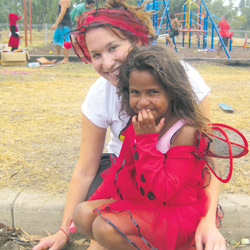Outback dreams come true for kids
ABORIGINAL children are not the only beneficiaries of a Jewish community program that visits a remote part of Australia.
DANNY GOCS
IN an outback Aboriginal community in north-west NSW, there’s an air of excitement among the Aboriginal children as they await a visit by a group of young Jewish adults.
The visits have become a regular feature in the Toomelah and Boggabilla Aboriginal settlements situated in remote country near the NSW-Queensland border, where the Jewish volunteers spend 10 days working with Aboriginal children on holiday programs.
Organised by Jewish Aid Australia (JAA), in association with the Shalom Institute of NSW, the visits are part of the Derech Eretz program held each January and July.
This year’s summer group comprised 13 people, mainly university students from Victoria and NSW, who left Sydney on January 23 on a two-day bus ride to reach the Aboriginal communities. The group was led by JAA CEO Gary Samowitz — who was making his eighth visit — and included Monash University student and former SKIF rosh Rebecca Shonberg, 21.
“As soon as we arrived we got a warm welcome from the kids. They had been looking forward to our arrival,” said Shonberg.
The main activity is a holiday program for children in the Aboriginal communities of Toomelah and Boggabilla in arid country near Goondiwindi, about 370 kilometres south-west of Brisbane. Toomelah is an isolated settlement with only a few buildings, including a school, while Boggabilla is situated on a main highway with shops and more facilities.
“When you first arrive you get a shock — it seems like you are in a third-world country in our own backyard,” said Shonberg. “Most of us are from Caulfield or Bondi and have never been to an Aboriginal community before.”
A typical day involved conducting holiday activities for children aged
2-12 years during the morning, while attending lectures from members of the local community during the afternoon.
“The holiday program was important for the kids — otherwise they would be roaming the streets with nothing to do,” said Shonberg. “The kids loved it and would keep coming back every day.
“One day we went into Goondi¬≠windi and drove around in our mini-bus for 10 minutes announcing a kids’ holiday program. When we got back to the meeting place there were dozens of kids waiting for us.”
Conditions were hot with temperatures reaching more than 40 degrees and the volunteers were thankful that their motel was air-conditioned.
“It was not a holiday, but it was a fun and rewarding experience. It was a way of giving something back to the wider community while learning about ourselves and what being a good Jew is,” said Shonberg.
All the participants volunteered for the Derech Eretz program to help assist in humanitarian projects in the wider community and to practise the Jewish concepts of tzedakah (justice), chesed (kindness) and tikkun olam (repair the world).
Samowitz said Derech Eretz was established five years ago to build a relationship with indigenous communities that would allow for intensive engagement and learning by student-age volunteers while helping the communities.
“The Jewish community has the resources and the responsibility to help those in need,” said Samowitz. “The Aboriginals have a beautiful culture but their communities need assistance.”
He said the Derech Eretz program had built a strong relationship with the Toomelah and Boggabilla communities and the Aboriginal elders had praised the work of the long-term project.
“The volunteers that go to these Aboriginal settlements learn about issues facing the Aboriginal community through first-hand experience and by meeting community leaders.”
In 1988, then-justice Marcus Einfeld, in his role as head of the Human Rights and Equal Opportunities Commission, visited Toomelah and was shocked by what he saw. The inhumane living conditions and the lack of basic services such as electricity, sewerage and clean water moved him to tears.
The Toomelah Report, which was the outcome of that visit, stated that “no Australian citizen should be living in such conditions in 1988, especially when the conditions are determined and provided by the organs of the government”. The report made a range of recommendations, many of which were later implemented.
Samowitz said the Aboriginal people could look to the Jewish ­community when it comes to ­preservation of culture, memorialisation of past genocide and community unity. But in turn, the Jewish people have so much to learn from the Aboriginal community about humility and understanding the land.
He said there were plans for the Derech Eretz program to expand to other Aboriginal communities in the future.
Samowitz said another benefit of the Derech Eretz program was that it helped volunteers who were not strongly involved in the Jewish community to meet other young Jews.
“Some people are not actively involved in the community and this program provides an opportunity to make other Jewish friends,” he said.
“On one program we had a volunteer whose first Shabbat experience in many years was on a remote Aboriginal community.”
For more information about the Derech Eretz program, contact Jewish Aid Australia on (03) 9500 2206 or visit www.jewishaid.org.au.


comments